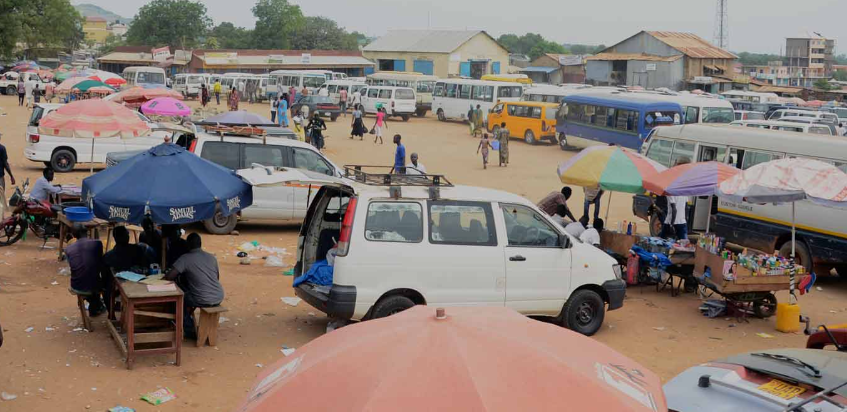
Custom bus park. | Courtesy.
Some motorists and members of the public have decried the rise in fuel prices in Juba, a situation that has made public transport unaffordable to many of the city residents.
On Monday, 4th March 2024, a liter of petrol was increased from 1,500 to 2,200 South Sudanese pounds in all fuel stations in Juba.
The move has prompted the public transport drivers and riders to increase fares in accordance with different locations of Juba.
Boarding a Rickshaw from Suk Kakuma to Custom Market will now cost passengers 1,000 SSP instead of the previous 500.
In the same route, passengers are now paying 700 instead of 500 SSP for minibuses while big buses have increased fares from 400 to 700 SSP.
From Jebel Market to Gudele, the price of bus transport increased from 700 to 1,000 SSP, while it has risen to 1,000 from Jebel Market to Konyo-Konyo.
“It is very hard because transport is more than what we are earning now. imagine earning small, and transportation keeps on increasing every day,” said one of the Juba residents, who declined to reveal his name.
“Personally, I failed to eat today. I eat once a day, even sometimes I take only tea and sleep hungry just to reserve some money for transportation.”
Another Juba resident fears that the whole prices of commodity has increased in the market, in what will not only mean, he will not only be able to afford to board a bus, but also struggle to feed himself and his family.
‘Transports and everything’s in the market has gone up, and this increase, even if dollar go down, it will remain high like that, that why we the people of South Sudan we are suffering.”
“I actually spend 3,000 for going and coming back, sometimes is become more because if you delay, you use boda and end up spending something like 5,000. If you use rickshaws, it is more than even the taxi.”
On their part, some of the motorists referred the recent increase of the price to the increase of fuel in the country.
“The price of gasoline has risen to 2,200 at gasoline stations. Therefore, when the price of gasoline increases, we also increase. We are suffering these days from a significant increase in gasoline prices.”

“In the past, we transport passengers between 300 and 500, but with the rise in gasoline prices, we had to raise the delivery cost to 1,000 or sometimes to 1,500, which made citizens complain about the situation.”
“Citizens blame us as drivers, and when we ask the owners of gasoline orders, they say that the problem is the high price of the dollar. This situation made us raise the value of transporting citizens to 700, which made some people prefer to walk rather than use cars due to the difficult economic situation.”
Mr. Osman Elisa, one of the organizers of Jebel Market Bus Station said the drivers’ association has not officially increased the bus fares.
Elisa said the drivers unilaterally increased the transport fares in response to the unexpected increase in fuel prices.
“The truth is that vehicle drivers are crying because of the increase in fuel prices, but for us as a union, we heard that there is chaos due to the increase in prices,” he said. “We did not increase prices; we have never done so.”
“But what happened was an understanding between the drivers and the passengers but as an official increase from the union, this never happened because we expect fuel prices to fall at any time from now.”
Mr. Major Majak, the manager of one of the Petro stations in Juba, said the increase in Fuel is due to depreciation of South Sudan pound against the US dollar.
“There is no unified price for goods that are imported from abroad because of the price of the dollar, as the value of goods, such as gasoline, rises with the rise in the value of the dollar against the pound.”
“We used to sell the price of a liter of gasoline for 1,700, then it rose to 1,900 with the rise in the value of the dollar in these two days. We were forced to raise the price.”
Support Eye Radio, the first independent radio broadcaster of news, information & entertainment in South Sudan.
Make a monthly or a one off contribution.
Copyright 2024. All rights reserved. Eye Radio is a product of Eye Media Limited.